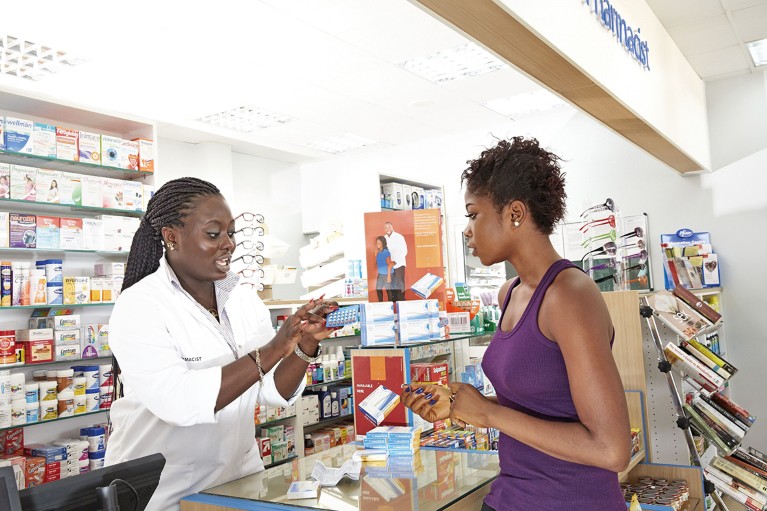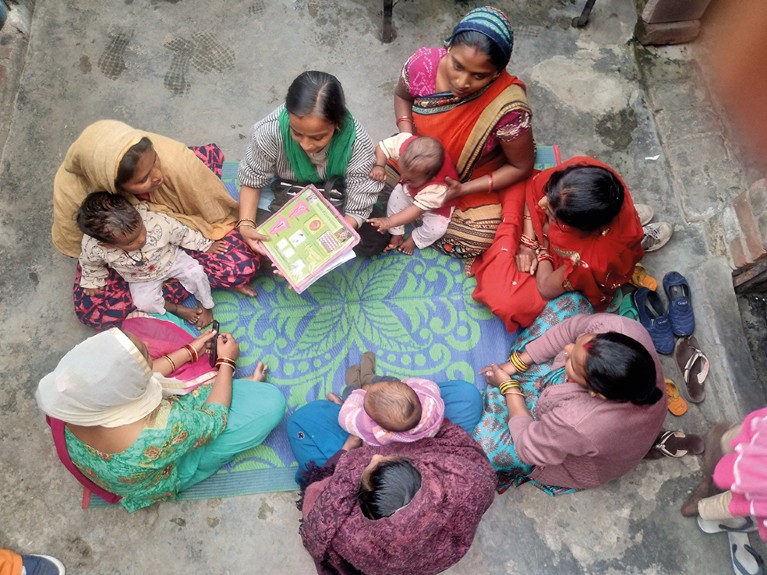Whether or not girls or young women complete their education and thus improve their opportunities in life depends to a large extent on their family planning options. Can they make informed decisions for themselves about whether to have children and, if they do want them, when to have them and how many?
Sex education and access to modern family planning are crucial to help people make important life decisions. Furthermore, both education and conversations about family planning strengthen gender equality and the role of women worldwide.
Family planning is a human right
For more than 50 years, access to voluntary family planning has been a human right, as agreed upon in 1968 at the International Conference on Human Rights in Tehran1. This added, for the first time, the notion of gender equality to the more general theme of how population growth might be limiting economic growth, thereby hindering the full advancement of human rights. In the following decades, an intense public discourse was held on the economic and political dimensions of population growth, eventually leading to a widely accepted and broader understanding of family planning. It was linked more closely to a rights-based approach rather than focusing on population development alone. This was affirmed in the action programmes of subsequent world population conferences, including the Cairo Programme of Action of 1994, which introduced the concepts of sexual and reproductive health and reproductive rights2.
For the majority of women living in western industrialized nations, access to family planning services is commonplace. However, the situation is different in many other regions of the world, where access to family planning is not yet adequately guaranteed. Bayer believes that access to voluntary family planning will help to achieve several of the United Nations Sustainable Development Goals (SDGs). This includes, for example, the SDG 3 on good health, ensuring people live healthy lives, reduce child mortality and raise life expectancy, as well as SDG 5 which relates to gender equality. Family planning plays a crucial role in reducing poverty and hunger, improving the health and well-being of communities, ensuring high-quality education and economic growth, and sparking institutional and ecological changes (Fig. 1). All these factors help communities and countries move towards fairness and equality. According to the United States Agency for International Development (USAID), investing in family planning is a development ‘best buy’ that can accelerate multiple achievements across SGDs3.

Figure 1. A woman collects her contraceptive prescription from her pharmacist.
Unintended pregnancies, maternal death and social norms
In 2012, around 40% of all pregnancies globally were unintended4. At least 10 million unintended pregnancies occur each year among adolescent girls aged 15–19 in the developing world. According to the World Health Organization (WHO), adolescent women face higher risks of eclampsia, puerperal endometritis, and systemic infections than women aged 20–24 years, and babies of adolescent mothers face higher risks of low birth weight, preterm delivery and severe neonatal conditions. Moreover, the WHO says that young adolescents (ages 10–14) face a higher risk of complications and death as a result of pregnancy than other women.
Limited or no access to contraception could result in generations of young women losing the opportunity to complete their school education, achieve economic independence and maintain their physical health.
Bayer works with international partners to help combat the challenges presented by unintended pregnancies.
One key element of the company’s work is focused on education about sexual rights and contraception options. In 2007, working in close collaboration with 15 international partners, Bayer launched the education campaign ‘Your Life’, which is aimed at young people around the world and centres on the annual World Contraception Day, held on September 26. A website (www.your-life.com) and social media activities provide facts and figures about current methods of contraception and address common concerns, ranging from fears of permanent infertility by using an IUD to the safety of re-used condoms.
When it comes to modern family planning, awareness and social acceptance present major obstacles for many women for using modern contraception. Peer-to-peer education can be a powerful tool to overcome some of these obstacles. This is why it is important to strengthen the competencies and resources of young sexual and reproductive health and reproductive rights activists and leaders in low-and middle-income countries. Several initiatives have successfully taken this approach, including the ‘120 Under 40’ initiative (www.120under40.org) run by the Bill & Melinda Gates Institute for Population and Reproductive Health or the Young Leaders Program by Women Deliver (womendeliver.org), which have also been supported by Bayer through co-funding.
Access to reproductive health services
If awareness and demand for voluntary family planning is present, the access to service delivery remains a challenge in many places. This includes especially informal settlements of growing cities in low- and-middle income countries. Whilst densely populated, these areas are often under the radar for municipal authorities. More than 50% of the world’s population already live in urban centres and that figure is set to rise5 to over 80% by 2050.
Since July 2020, Bayer has been supporting ‘The Challenge Initiative’ along with the Bill & Melinda Gates Foundation and other partners (Fig. 2). The Challenge Initiative (TCI) aims to roll out tried-and-tested family planning options rapidly and sustainably on a large scale. So far, TCI supports more than 95 cities in implementing urban reproductive health solutions across 10 countries in 4 regions (East Africa, Francophone West Africa, Nigeria and India) by enabling local governments to scale up high-impact family planning solutions6.

Figure 2. Women discuss reproductive health and family planning as part of The Challenge Initiative, an initiative operating in partsof Africa, India and the Philippines.
TCI’s ‘business unusual’ approach allows cities to bring their monetary contributions, ideas and political commitment to the platform. In return, they have access to a challenge fund for additional resources, as well as technical expertise to adopt and scale up high-impact best practices that have been codified for easy adaptation through TCI University. The online ‘university without walls’, alongside a dedicated coaching model, has helped TCI continue to operate during the COVID-19 pandemic.
By institutionalising this approach, local governments are set on a path toward self-reliance, which allows the programme to scale to more and more cities over time.
As a main donor, it is important for Bayer to emphasize that contraceptive supplies in participating cities are procured completely independently of donor or provider preferences. They are committed to supporting this programme because it provides a groundbreaking opportunity to create a long-lasting impact in under-served, growing urban communities.
Access to contraceptive supplies
According to data from the World Health Organization, the need for modern methods of contraception is largely unmet for more than 200 million women in low- and middle-income countries. The WHO states that as populations in low- and middle-income countries grow, the demand for modern contraceptives will continue to rise and the next generation of young women will be increasingly unwilling to miss out on the benefits of voluntary family planning. The latter has been depicted by demographic and health survey data from more than 40 countries. In many of these countries, the prevalence of contraceptive use amongst adolescents increased faster than amongst older women7.
Bayer has been supporting access to contraceptive supplies for six decades, operating in more than 100 countries as a commercial supplier, and providing contraceptives to international family planning programmes globally at preferred prices.
In 2007, Bayer became a member of the Reproductive Health Supplies Coalition (RHSC), a global partnership of public, private and non-governmental organizations. The RHSC is dedicated to ensuring that all people in low- and middle-income countries can access affordable, high-quality contraceptives to ensure optimal reproductive health. Within the RHSC framework, Bayer works with the United Nations Population Fund (UNFPA), USAID and international NGO’s to provide hormonal contraceptives, including contraceptive pills, quarterly injections, implants and coils. As a strategic partner in reproductive health programmes the company also provides expertise in delivery, logistics and other areas, for example by contributing to quality, safety and product registration.
Bayer currently provides about 40 million women in low- and middle-income countries with contraceptives. Around half of the women are reached through private sales channels – primarily in upper-middle income markets. The other half, predominantly women in low and low-middle income countries, obtain access through the international development network, for instance through the UNFPA or participating national family planning programmes. Supplies provided through such programms are free for the women using them in most cases.
In order to address the challenges of access to contraception in the upcoming decade, Bayer is stepping up its efforts in terms of partnerships, supply volumes and method choices.
A choice of methods
Women’s personal circumstances can be as important as their personal preferences and medical indications when they are selecting a method of contraception. Approximately 45% of people worldwide who use contraception opt for long-acting methods (female/male sterilisation, intrauterine device, implant), and some 46% use short-acting methods (condom, pill, hormone injection and other modern methods). Sterilisation is the dominant long-acting method of contraception, used by approximately 235 million males and females in total, but with a decreasing trend. Approximately 159 million women worldwide between the ages of 15 and 49 use an intrauterine device. The second most common reversible long-acting method worldwide are hormone implants, with approximately 23 million users (women aged 15 to 49)8.
Reversible long-acting methods such as hormone implants or coils are more practical in regions where medical provision is scarce, because these usually require little effort or attention in terms of medical intervention after they have been put in place.
In order to increase the availability of hormone implants, the Implant Access Program (IAP) was established as a private/public partnership from 2014 to 2018, whereby Bayer committed a 50% reduction in price until 2023, for women in the poorest countries. This was possible due to the framework provided in the IAP, because volume guarantees made it easier for pharmaceutical suppliers to manage demand fluctuations and uncertainties9. The IAP is considered a successful system intervention, because with lower costs and demand increasing, the supply was able to follow accordingly. The demand for implants is expected to grow further in the coming years10, while current levels of supply seem to have reached a limit given by globally available production capacities. As a consequence, Bayer has increased its implant supply capacities by 30% as of 2020, and plans further expansion in the near future.
One of the most sought-after long-acting methods in high-income markets in the levonorgestrel intrauterine system (LNG IUS), which Bayer provides under the brand name of Mirena®. At present, women in low- and low-middle income countries, who represent around half the world’s population, have hardly any access to this method11. On the occasion of the International Conference on Population and Development (ICPD) in Nairobi in 2019, Bayer made the commitment to explore options to make hormonal IUS more affordable in low- and middle-income countries (LMIC) through preferable price levels for the public channel.
In addition to the approach for the public and international aid sector, Bayer is currently adopting an equitable pricing approach that incorporates country-level affordability. Respective pricing policies have been recently implemented for core products, including Mirena.
The 100 million challenge
Contributing to sustainable development has become a core element of Bayer’s corporate strategy. Bayer is increasingly focusing its activities on providing more people in all the regions of the world with access to health care and food, as well as devising solutions to the challenges presented by climate change and protecting the environment. With their sustainability strategy, one of the four strategic levers of Bayer, they are addressing the major challenges of our time and strengthening the societal impact of their company and business. At many instances, this perspective will provide inclusive growth as a new type of value creation from which everyone can benefit.
In terms of Bayer’s engagement in contraception, the contributions to the international aid ecosystem are following a decades-long legacy with a not-for-profit attitude, committing significant investments in production facilities and partnerships.
In order to anchor family planning commitments into the sustainability strategy, Bayer aims to provide 100 million women in low- and middle-income countries per year with access to modern contraceptives by 2030. This self-selected goal has become one of the sustainable development targets the company adopted in 2019. It can be achieved, as described, by providing more choices to women in LMICs, together with strong partnerships for access to family planning.
Women play a pivotal role in achieving the UN Sustainable Development Goals and Bayer believes that equality between men and women is an important factor for global economic and social development. As stated by the UN: “Achieving gender equality and women’s empowerment is integral to each of the 17 goals. Only by ensuring the rights of women and girls across all the goals will we get to justice and inclusion, economies that work for all, and sustain our shared environment now and for future generations”12.

